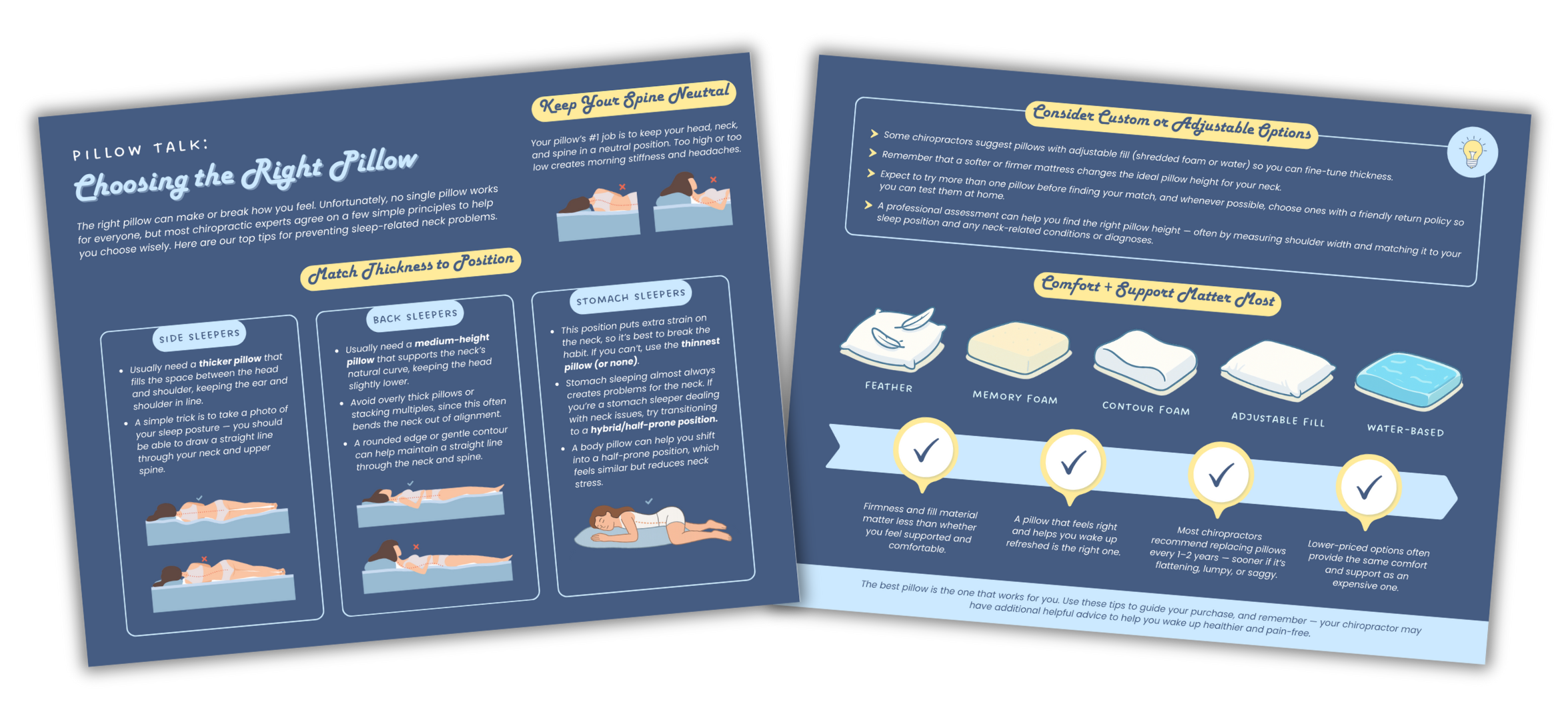Sleep Your Way to Less Pain
Could your bed be making your pain worse? Waking up stiff, sore, or just plain tired doesn’t always mean you overdid it during the day. Sometimes the problem is how you sleep. Your pillow and mattress play a big role in supporting your spine and helping your body recover. The wrong setup can make pain stick around longer and slow your progress.
Did you know?
Even losing just one hour of sleep can make your muscles recover more slowly and increase sensitivity to pain.
Tips for a Better Sleep Setup
1. Mattress
Your mattress plays a huge role in how well your body recovers overnight. A mattress that is too soft or too firm can leave your spine misaligned, leading to stiffness, soreness, or even increased sensitivity to pain. Most experts recommend a medium-to-firm mattress for balanced support. Over time, mattresses lose their ability to support your body properly, so replacing them every 5–8 years is essential to maintain comfort and spinal alignment. Investing in the right mattress can make a noticeable difference in how refreshed you feel each morning and how quickly your body recovers from daily activities or chiropractic care.
2. Pillow
The right pillow is just as important as your mattress for supporting healthy sleep. Your pillow should keep your head and neck aligned with your spine, preventing awkward angles that can lead to tension and soreness. Avoid stacking multiple pillows or using overly thick foam, which can tilt your neck unnaturally. Sometimes, a simple, well-chosen pillow can dramatically reduce morning stiffness and improve your overall sleep quality. Choosing a pillow that matches your preferred sleep position—side, back, or occasionally stomach—ensures your body is supported where it needs it most.
3. Sleep Positions
How you position your body while sleeping can affect both comfort and recovery. Key tips include:
Side sleepers: Place a pillow between your knees to keep your hips and spine aligned, reducing strain on your lower back.
Back sleepers: Place a pillow under your knees to maintain the natural curve of the spine.
Stomach sleeping: Usually not recommended, as it can twist the neck and put pressure on the back, but some people may find relief with specific adjustments or pillow placement.
Paying attention to your sleep position helps support your spine overnight, allowing your body to rest more effectively and recover faster from daily stress or discomfort.
Healthy Sleep Habits
Good sleep isn’t just about your mattress, pillow, or position — your habits matter too. Try these tips to improve rest and support recovery:
Limit screens before bed: Blue light from phones, tablets, and TVs can keep your brain alert and make it harder to fall asleep.
Create a cool, dark environment: Aim for a bedroom temperature between 60–67°F to help your body relax.
Keep a consistent schedule: Going to bed and waking up at the same time every day—even on weekends—supports your body’s natural sleep rhythm.
Watch your evening intake: Avoid caffeine or heavy meals in the hours before bed to prevent disruption to your sleep.
For more tips on creating healthy sleep habits, check out this infographic.
Next Steps
Ask your chiropractor to review your sleep setup. With the right mattress, pillow, and sleep habits, you can rest better, recover faster, and wake up ready to move pain-free.
Schedule a visit to review your sleep setup. Your best night’s rest (and recovery) starts here.




